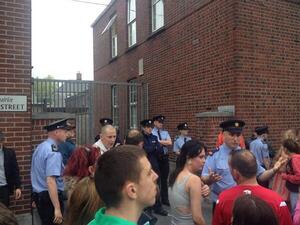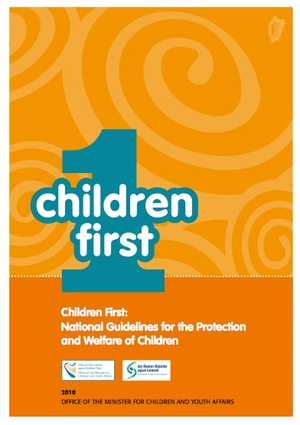This morning Pat Kenny said he had asked for a representative of the Catholic Communications Office of the Irish Catholic Bishops’ Conference and for spokespeople from the religious orders mentioned in yesterday’s NBSCCC’s audits to appear on his RTE R1 show.
Nobody was available.
So he spoke with American canon lawyer Fr Tom Doyle (above), of the Dominican order instead.
Maybe Sean Brady was listening.
Pat Kenny: “You’ve been looking at the details of some of these reports and listening to what’s emerged from Ireland overnight. What is your reaction to what is being revealed?”
Fr Tom Doyle: “Well the reports, and the contents of the reports, and I will admit that I did read them all, is certainly consistent with, perhaps not as detailed, but consistent with what came out in the other reports that were done with the Governmental commissions and I think, apart from rehashing the neglect, of the proper response, the cover-up, the shuffling of priests around, they do continue to reveal a very deeply, deeply flawed clerical culture in which the church has existed for, you know, decades if not centuries with regard to children. And I think they also reflect, continue to reflect, a clerical culture, clerics and a leadership, you know, severely out of touch – not only with the real world that we are living in. But also with, you know, fundamental concepts of human nature. An unawareness of the gravity of abuse of children by anyone, much less a cleric in a profoundly Catholic culture and the harm that this can do. The fact that this went on in so many dioceses in Ireland – even after the revelations in Ireland and in the United States throughout the Nineties and into the new millennium is amazing. I certainly agree with the remarks of some of the others that have spoken out in Ireland. And it’s amazing that these religious orders continued to function as if the Ferns Report never even happened, which was the first one in 2005.”
Kenny: “That they didn’t learn the lessons that absolute transparency, absolute disclosure, absolute reporting of everything to the State authorities was what was required?”
Doyle: “They didn’t learn that and I think, even deeper than that, there is almost, one could consider, an inability to comprehend the horrendous nature of the culture of abusing children, then neglecting the victims and covering the abusers.”
Kenny: “Now there has been much comment on what Bishop Kirby, Bishop John Kirby from the Diocese of Clonfert said yesterday about his understanding of paedophilia and I’ll just play about 20 seconds of that:
“It was as far back as 1990 in the first case and 1994 in the second case. And I was unaware of the recidivus nature of the compulsive nature of sexual abuse and I felt that it was a friendship that had gone astray. It was wrong. I now know how bad that was. It was a grave mistake”
Kenny: “‘A friendship that has gone astray’. That was the bishop’s understanding of it. And I will take that at face value that that is literally the state of his ignorance of paedophilia at the time.”
Doyle: “Well I agree. And I have to say this much about Bishop Kirby though. He did have the courage to do what very few bishops had done. He apologised for himself, what he did not do right, what he failed to know. He didn’t say things like ‘I’m sorry for the pain you might have suffered. I’m sorry for the problems’. Nonsense like this, this is what we’ve heard in the United States, time and time again. But we’ve hardly ever heard a bishop say ‘I’m sorry for what I did wrong’. And I think bishops, poor Bishop Kirby is being clobbered for the remarks he made. But he simply verbalised what has been true about so many. And this is what is shocking. If they are honest – that this is what they understood sexual abuse to be, that it was ‘friendship gone wrong’, this is unbelievable. That these men who are the leaders of the Catholic Church and in Ireland they’re certainly cultural leaders aswell, cause of the position of the church there, this is the fate of either their wilful ignorance or their inability to comprehend the horrific nature of this crime.”
Kenny: “Now in this case he confessed to wilful ignorance, well no wilful ignorance, simple ignorance as to the nature between a priest and a boy, that it just went beyond the boundaries, that was his understanding of it. We know how wrong-headed that understanding was. But it would appear that other bishops have chosen, if you like, to take the hit for no reporting the crimes that were being committed on the basis of protecting the church or not realising that although it was wrong, that it wasn’t wrong enough to be reported to the police. I’m wondering which is the more serious attitude to have adopted?”
Doyle: “I think the attitude of protecting the church is very, very seriously wrong because it revealed a misunderstanding of what the church is. The church is the people. The church is these children and their families. And complete neglect, in favour of the prestige for the institution, in other words the image of the leadership, the clerics and the bishops. Where this is.. what’s at the primary importance and there’s something seriously wrong with that. And that’s been revealed not just in Ireland but all over the Western world. it’s certainly true in the United States.
What these reports have shown is not that there are serious problems with the church in these three (sic) diocese and religious orders but also..not they’re. But they’re reflecting is what we’re seeing all over the place. That, in spite of the contemporary, you know, the conservative, almost reactionary nature of the hierarchy and the papacy, there is something deeply, deeply wrong with their preaching and with their understanding of their role in the world, if they continue to take a defensive posture with regard to children. And I have to say that I think the biggest flaw in these reports and in the other set of reports that were revealed in December has been the failure to recognise that certainly it’s important to protect children in the future but there’s a complete failure to acknowledge the absolute need for healing and care for the victims of the past who are alive in the present, bearing these terrible scars and this terrible trauma. It’s almost as if they don’t exist. And there should be..One of the reports, the Dominicans, said something very important and it was the fact that they chose to make payments, restitution payments if you want to call them that, to the victims, rather than engage in lengthy, painful court processes against victims who chose to sue them. And there should have been more mention of this, you know. What have these religious orders and dioceses done in those incidences where victims have chosen to go to the civil court? Have they continued to punish them as has been the case? You know the church will say ‘we’re so sorry for what happened but if you dare to sue us we’re going to pound you into the ground’. That has been the case in the United States. And that shows the abject hypocrisy of the response.”
Kenny: “But in terms of making restitution and making payments, rather than putting people through the trauma of the civil courts. There are two interpretations. One is the charitable one, that it saves people the stress and indeed possibly the publicity that might attach to all of this. The other is that it protects the perpetrators from exposure.
Doyle: “Well I agree with both sides. I don’t think there’s any excuse for protecting the perpetrators from exposure. But I, maybe, let me say this. That if they go into the civil courts and engage in a process the key issue is that the church not expend untold amounts of money and effort on having their lawyers defend, at all costs, the institution or the image of the bishops of the religious order. Perhaps it’s the way that the process is carried out. What we’ve seen over here is diocese after diocese and order after order expending and putting all sorts of resources into their defence of themselves. And it’s really attempting to destroy the victims for having the audacity to take them to court. We found, and I believe it’s true all over the world that the only power that has been successful in forcing the institution the Catholic Church to at least begrudgingly do what is right has been a power greater than itself and that is the civil court system. That’s why it’s been turned to by so many of the victims because they cannot…they have not been able to get justice, or satisfaction or see accountability through the ecclesiastical system the church court, canon law, canon law which is practically useless and has been in bringing about assistance for victims so they’ve gone to the civil courts. And there, they have found, with tremendous expense, both emotional, psychological and financial, they’ve found some way to get some satisfaction.”
Listen here




